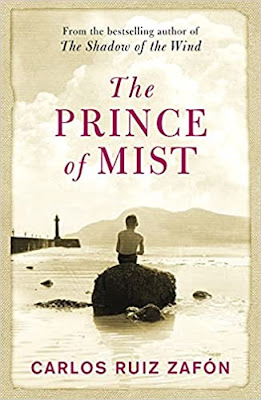Book #76
In 1943, Max Carver's father - a watchmaker and inventor - decides to move his family to a small town on the coast, to an abandoned house that holds many secrets and stories of its own.As the family settles in they grow increasingly uneasy: Max’s sister Alicia has disturbing dreams while his other sister, Irina, hears voices whispering to her from an old wardrobe. With his new friend Roland, Max also discovers the wreck of a boat that sank many years ago in a terrible storm. Everyone on board perished except for one man - an engineer who built the lighthouse at the end of the beach.As they learn more about the wreck, the chilling story of a legendary figure called the Prince of Mist begins to emerge.
With war approaching, Max and his family move from their city home to a quieter life by the sea. We begin with the uncomfortable feeling this brings; it feels like fleeing - the family are leaving everything behind and stepping into the unknown. Zafón creates an emotion a little bit more than apprehension and a little bit less than dread as we approach our new life alongside the Carvers.
Max soon discovers a strange walled garden filled with statues close to his new home (definitely the type of place I’d run from without a second thought) and Zafón expertly evokes a mystical fear in us - there’s something not quite right about these statues. We are soon plunged into the arms of an ominous entity- the Prince of Mist. He’s a terrifying being, hellbent on destruction, and we witness Max’s attempts to ruin him.
This is a fairly short novel with heaps of action which I felt overshadowed the characters. Zafón sets up well, allowing us to become interested in his cast, only to remove a few of them entirely from the plot to make room for his demon. This is a shame, as I would’ve loved a closer look into the minds of some of the others - particularly Max’s father and the Prince of Mist himself.
As a predecessor to the Shadow of the Wind series, The Prince of Mist clearly shows Zafón's early skill. His magic throws itself off the pages, with eerie and unsettling reality, transporting us to a time of both real and supernatural tension. I’d forgotten just how masterful his prose is; perhaps it’s time to return to the Shadow of the Wind for some more of this.

